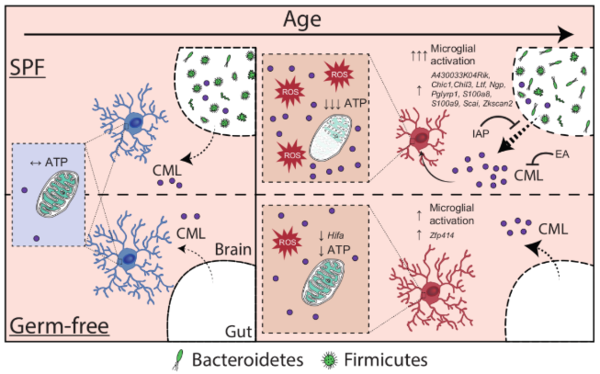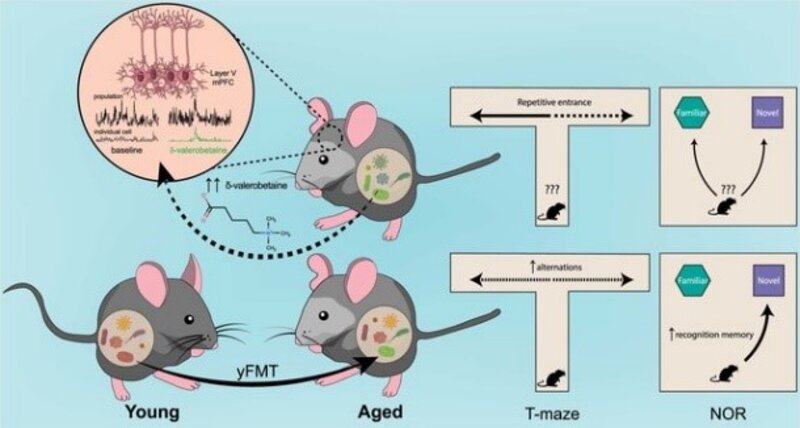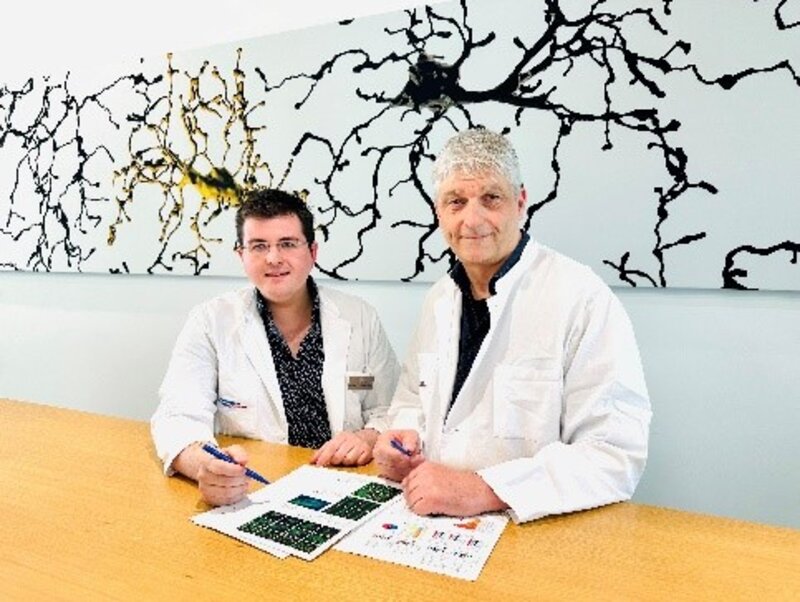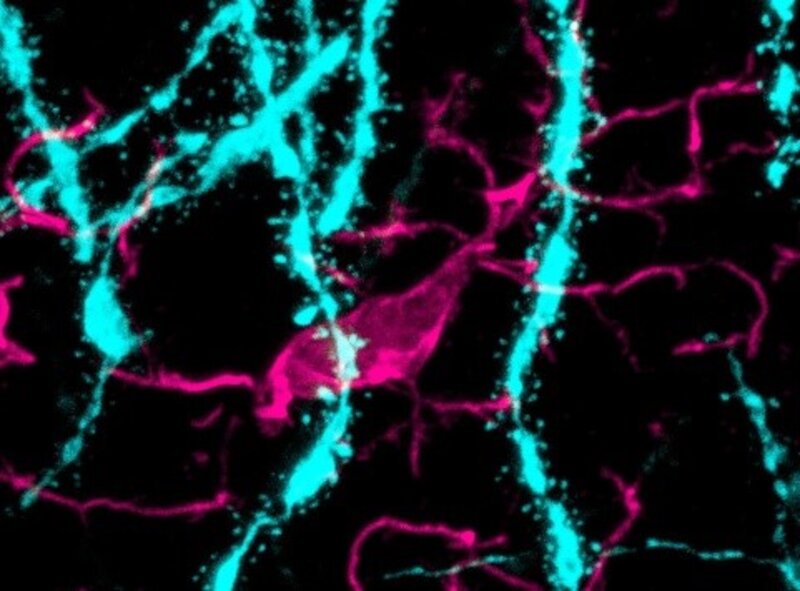Gut Microbiota: Driver of Age-Related Oxidative Stress and Mitochondrial Damage in Microglia via N6-carboxymethyllysine

In one of our recent studies, we made an intriguing discovery regarding the accumulation of N6- carboxymethyllysine (CML) and its relationship to nutrition and aging. Our research focused on investigating the interaction between microglia and the gut microbiota in young-adult and aged mice under different housing conditions.
Microglia, the immune cells in the brain, undergo functional changes as we age. While the influence of the gut microbiota on microglia during development and adulthood is well-known, its impact on microglial function in aging remains unclear. To explore this, we compared the gene expression profiles of microglia from young-adult and aged mice housed under germ-free (GF) and specific pathogen-free (SPF) conditions.
Remarkably, we found that the presence of gut microbiota significantly influenced the age-related.
changes in microglial gene expression. Microglia from aged mice with an intact gut microbiota exhibited increased oxidative stress and mitochondrial dysfunction, both of which are associated with aging. However, when the gut microbiota was absent in aged mice, these detrimental effects were ameliorated. This suggests that the gut microbiota plays a crucial role in driving age-related oxidative stress and mitochondrial damage in microglia.
Further investigation using metabolomic analyses revealed the accumulation of N6-carboxymethyllysine (CML) in the microglia of the aging brain. CML is a metabolite associated with advanced glycation end products, formed through the oxidation and glycation reactions of proteins. Interestingly, CML mediated a surge in reactive oxygen species (ROS) production and impaired mitochondrial activity and ATP reservoirs in microglia.
To validate our findings in a human context, we examined the levels of CML in the sera and brains of humans and found a similar age- dependent increase. This strengthens the connection between CML accumulation and aging.
Importantly, we identified that the increased levels of CML in microglia and circulation were not directly derived from microbial metabolism. Instead, the elevated intestinal permeability observed in aged mice with an intact gut microbiota allowed CML to translocate from the gut into the bloodstream and eventually reach the brain. This suggests that the gut barrier integrity plays a crucial role in regulating the accumulation of CML and its impact on microglial function.
Our study sheds light on the intricate interplay between the gut microbiota, nutrition, and aging. The findings highlight the potential role of dietary factors in driving age-related changes in microglia and provide new perspectives on how nutritional interventions may influence brain health during aging. Understanding the mechanisms by which the gut microbiota affects microglial function can pave the way for novel therapeutic strategies aimed at maintaining brain health and combating age-related disorders.
Mossad, O., Batut, B., Yilmaz, B., Dokalis, N., Mezö, C., Nent, E., Nabavi, L. S., Mayer, M., Maron, F. J. M., Buescher, J. M., de Agüero,
M. G., Szalay, A., Lämmermann, T., Macpherson, A. J., Ganal-Vonarburg, S. C., Backofen, R., Erny, D., Prinz, M. & Blank, T. Gut microbiota drives age-related oxidative stress and mitochondrial damage in microglia via the metabolite N6-carboxymethyllysine. Nat. Neurosci. 25, 295–305 (2022).
Microbiota-Dependent δ-Valerobetaine Increase Alters Neuronal Function and Contributes to Age-Related Cognitive Decline
Understanding the physiological origins of age-related cognitive decline is crucial, especially considering the global increase in the aging population. Previous research in animal models has established a strong association between cognitive performance and the gut microbiota, and it is well-known that the microbiome undergoes significant changes in older adults. However, the underlying mechanisms linking the brain and the gut in the context of age-related cognitive decline remain poorly understood.

In this study, we employed fecal microbiota transplantation (FMT) to demonstrate that age-related remodeling of the gut microbiota leads to cognitive impairment in mice, which can be rescued by transplantation of microbiota from young animals. Additionally, utilizing a metabolomic approach, we discovered elevated levels of δ-valerobetaine, a metabolite derived from the gut microbiota, in the blood and brain of aged mice and older adults. We further revealed that δ-valerobetaine negatively affects learning and memory processes in mice.
At the neuronal level, we uncovered that δ-valerobetaine modulates inhibitory synaptic transmission and neuronal network activity. Lastly, we identified specific bacterial taxa that exhibit a significant correlation with δ-valerobetaine levels in the brain. Building upon these findings, we propose that δ- valerobetaine contributes to microbiota-driven brain aging and that targeting the associated mechanisms holds promise for mitigating age-related cognitive decline.
Mossad, O., Nent, E., Woltemate, S., Folschweiller, S., Buescher, J. M., Schnepf, D., Erny, D., Staeheli, P., Bartos, M., Szalay, A., Stecher, B., Vital, M., Sauer, J. F., Lämmermann, T., Prinz, M. & Blank, T. Microbiota-dependent increase in δ-valerobetaine alters neuronal function and is responsible for age-related cognitive decline. Nat. Aging 1, 1127–1136 (2021).

Neonatal Immune Challenge: Sex-Specific Epigenetic Microglial Reprogramming and Behavioral Impairment
In our recent study, we investigated the impact of early-life immune activation on the development of central nervous system (CNS) disorders, focusing on the sex-specific vulnerability. By simulating an early systemic viral infection in neonatal mice, we made significant discoveries regarding behavioral impairments.
Male and female neonatal mice were exposed to systemic murine cytomegalovirus (MCMV) infection or a simulated viral infection. Surprisingly, only male adolescent mice exhibited behavioral deficits, including reduced social behavior and cognition. We also observed an increased infiltration of T cells in the brain parenchyma, enhanced interferon-gamma (IFNγ) signaling, and notable epigenetic reprogramming in microglial cells.

The reprogrammed microglial cells exhibited heightened phagocytic activity, resulting in abnormal loss of excitatory synapses in the hippocampal brain region. Notably, these alterations were absent in female adolescent mice, highlighting the sex-specific susceptibility during the early postnatal period.
Further investigation into the immunological response in male mice revealed an elevated presence of T cells in the male brain following immune stimulation. We also observed increased pruning of dendritic spines by macrophages, which play a crucial role in learning processes. Interestingly, similar molecular changes and neuropsychological abnormalities were observed in both actual viral infections and pharmacologically induced immune stimulation, exclusively in male mice.
Interferon-gamma emerged as the driving force behind these observed alterations. Neutralizing interferon-gamma through specific antibodies prevented the cellular and molecular changes, ultimately mitigating the long-term concentration and social behavior abnormalities.
Our findings shed light on the sex-specific differences in CNS vulnerabilities following early-life immune challenges. Understanding these disparities has implications for developing targeted therapies and interventions for immune-related disorders.
This study contributes to the growing body of knowledge on the mechanisms underlying neuropsychological disturbances induced by early- life viral infections. By unraveling the impact of immune activation on microglial reprogramming and behavioral impairments, we aim to advance our understanding of CNS disorders and pave the way for future research and clinical applications.
Schwabenland, M., Mossad, O., Sievert, A., Peres, A. G., Ringel, E., Baasch, S., Kolter, J., Cascone, G., Dokalis, N., Vlachos, A., Ruzsics, Z., Henneke, P., Prinz, M. & Blank, T. Neonatal immune challenge poses a sex-specific risk for epigenetic microglial reprogramming and behavioral impairment. Nat. Commun. 14 (2023).
Selected Publications
Schwabenland, M., Mossad, O., Sievert, A., Peres, A. G., Ringel, E., Baasch, S., Kolter, J., Cascone, G., Dokalis, N., Vlachos, A., Ruzsics, Z., Henneke, P., Prinz, M. & Blank, T. Neonatal immune challenge poses a sex-specific risk for epigenetic microglial reprogramming and behavioral impairment. Nat. Commun. 14 (2023).
Blank, T. & Prinz, M. Objection non-responsive! How maternal immune activation in pregnancy weakens subsequent microglial immune response. Cell Res. 33, 193–194 (2022).
Hasavci, D. & Blank, T. Age-dependent effects of gut microbiota metabolites on brain resident macrophages. Front. Cell. Neurosci. 16, (2022).
Mossad, O., Batut, B., Yilmaz, B., Dokalis, N., Mezö, C., Nent, E., Nabavi, L. S., Mayer, M., Maron, F. J. M., Buescher, J. M., de Agüero,
M. G., Szalay, A., Lämmermann, T., Macpherson, A. J., Ganal-Vonarburg, S. C., Backofen, R., Erny, D., Prinz, M. & Blank, T. Gut microbiota drives age-related oxidative stress and mitochondrial damage in microglia via the metabolite N6-carboxymethyllysine. Nat Neurosci 25, 295–305 (2022).
Mossad, O., Nent, E., Woltemate, S., Folschweiller, S., Buescher, J. M., Schnepf, D., Erny, D., Staeheli, P., Bartos, M., Szalay, A., Stecher, B., Vital, M., Sauer, J. F., Lämmermann, T., Prinz, M. & Blank, T. Microbiota-dependent increase in δ-valerobetaine alters neuronal function and is responsible for age-related cognitive decline. Nat Aging 1, 1127–1136 (2021).
Wendeln, A.-C., Degenhardt, K., Kaurani, L., Gertig, M., Ulas, T., Jain, G., Wagner, J., Häsler, L. M., Wild, K., Skodras, A., Blank, T., Staszewski, O., Datta, M., Centeno, T. P., Capece, V., Islam, Md. R., Kerimoglu, C., Staufenbiel, M., Schultze, J. L., Beyer, M., Prinz, M., Jucker, M., Fischer, A. & Neher, J. J. Innate immune memory in the brain shapes neurological disease hallmarks. Nature 556, 332–338 (2018).
Mass, E., Jacome-Galarza, C. E., Blank, T., Lazarov, T., Durham, B. H., Ozkaya, N., Pastore, A., Schwabenland, M., Chung, Y. R., Rosenblum, M. K., Prinz, M., Abdel-Wahab, O. & Geissmann, F. A somatic mutation in erythro-myeloid progenitors causes neurodegenerative disease. Nature 549, 389–393 (2017).
Blank, T., Detje, C. N., Spieß, A., Hagemeyer, N., Brendecke, S. M., Wolfart, J., Staszewski, O., Zöller, T., Papageorgiou, I., Schneider, J., Paricio-Montesinos, R., Eisel, U. L. M., Manahan-Vaughan, D., Jansen, S., Lienenklaus, S., Lu, B., Imai, Y., Müller, M., Goelz, S. E., Baker, D. P., Schwaninger, M., Kann, O., Heikenwalder, M., Kalinke, U. & Prinz, M. Brain Endothelial- and Epithelial-Specific Interferon Receptor Chain 1 Drives Virus-Induced Sickness Behavior and Cognitive Impairment. Immunity 44, 901–912 (2016).

PD Dr. Thomas Blank
University Clinic Freiburg
Institute of Neuropathology
Breisacher Straße 64
79106 Freiburg
Tel.: +49 761 270-63105
Fax: +49 761 270-50500
thomas.blank@uniklinik-freiburg.de
